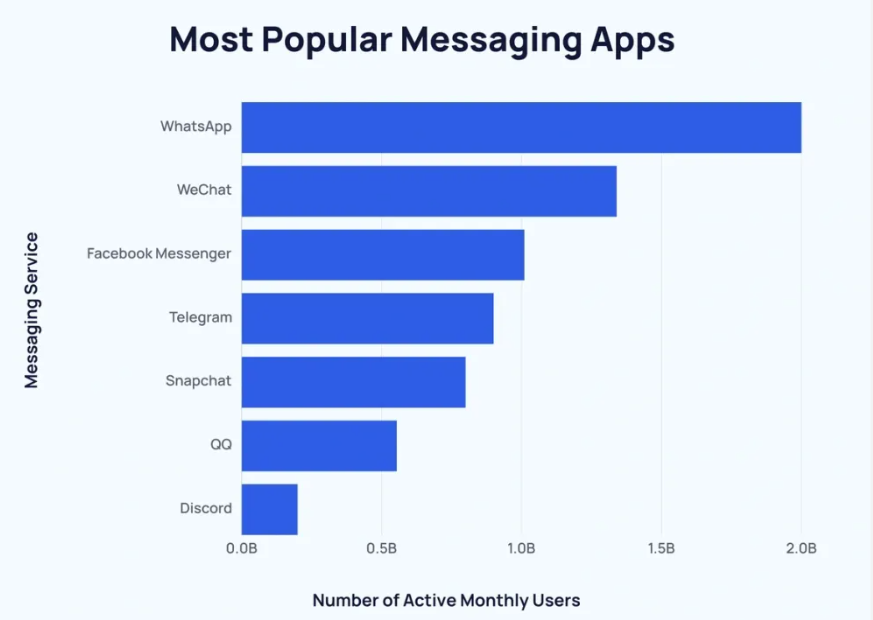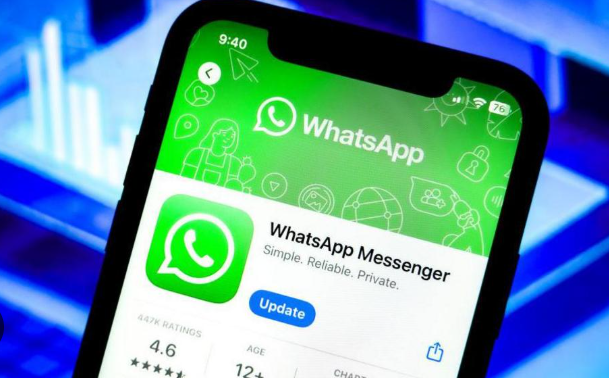Battle of the Apps! Whats App Market Share Grows
WhatsApp’s success is not built on features alone but on a foundational network effect. As the most-used messaging app globally, with over 2 billion users, its primary advantage is that everyone is already on it. For most casual users, this social inertia outweighs feature differences.
Updates in 2025, such as AI chat assistants, video call backgrounds, and enhanced chat privacy, ensure the app remains modern and competitive. Businesses are also deeply invested in the WhatsApp ecosystem, leveraging its API for sales, support, and marketing, which further entrenches the app in the everyday digital lives of billions.
The challengers: Telegram and Signal
Telegram and Signal pose different, yet significant, challenges to WhatsApp’s dominance. They each appeal to distinct segments of the market where WhatsApp has vulnerabilities.
Telegram: The feature-rich disruptor
- A feature powerhouse: While WhatsApp often plays catch-up, Telegram has long been a leader in features. Telegram’s 2025 updates further expanded its lead, adding collectible NFTs, advanced monetization tools for channels, and a revamped in-app browser. It also continues to support large groups (up to 200,000 members) and large file sharing (up to 2GB), capabilities that far exceed WhatsApp’s limits.
- Superior user experience: Telegram is cloud-based, meaning users can seamlessly access their entire message history across multiple devices without relying on backups. This synchronization is a significant advantage over WhatsApp’s more fragmented multi-device support.
- The privacy trade-off: Telegram’s primary weakness is its privacy approach. Regular chats are not end-to-end encrypted by default, a fact that makes it less secure than WhatsApp for general use.
Signal: The privacy champion
- Gold standard for security: Signal is widely regarded as the most secure messaging app available. All communications are end-to-end encrypted by default, and it collects virtually no user metadata. This makes it the preferred choice for activists, journalists, and anyone whose security is paramount.
- Consistent updates: Updates for Signal in 2025 have focused on refining core functionality, like improved scrolling in chats and better connectivity in low-signal areas, as well as new features like chat folders and polls. It also continued its open-source approach, reinforcing user trust.
- Limited features and network: Signal’s trade-off for its unmatched privacy is a more limited feature set and a far smaller user base. While its feature list is growing, it lacks the expansive ecosystem and social network of WhatsApp.
Analysis of the prediction
Where the prediction holds up
- Maintaining relevance: Consistent updates are non-negotiable for a market leader. They prevent stagnation and ensure the app remains competitive on a feature-by-feature basis with rivals like Telegram. Features added in 2025, including AI and advanced chat privacy, show WhatsApp is aware of modern user demands.
- Solidifying the business ecosystem: The stream of business-centric updates through the WhatsApp Business API is a powerful force. It locks more companies into the ecosystem, creating new revenue streams and making the platform more sticky for consumers who appreciate direct communication with brands.

Where the prediction falls short
- Network effect is paramount: The loyalty of most WhatsApp users is not to its features, but to its existing network. An incremental update is unlikely to convince a user to switch if all their friends and family are on WhatsApp. Conversely, a major blunder, like a privacy scandal, would be far more damaging than a competitor’s feature update.
- Innovation vs. evolution: While WhatsApp is constantly updating, much of its recent history has been defined by adding features pioneered by others. Telegram, in contrast, consistently releases genuinely new and unique functionality. This means WhatsApp is largely playing an evolutionary game, not a truly revolutionary one.
- Privacy vulnerability: WhatsApp’s updates cannot erase user concerns about its parent company, Meta. A recent lawsuit filed by a former head of security alleging Meta ignored data access and account hijacking risks is a reminder that the company’s reputation, not just its feature list, is under constant scrutiny. This provides a durable opening for privacy-focused alternatives like Signal.
- Regional monopolies: The global messaging landscape is not a single market. In some countries, powerful local apps like WeChat remain dominant, meaning WhatsApp will never truly “lead all other apps” everywhere.
Conclusion: WhatsApp’s ongoing updates are a necessity for retaining its top position in a fiercely competitive market. However, they are a defensive strategy, not a guaranteed path to victory. The company’s true strength lies in its network effect, but its ultimate fate will depend on how effectively it balances feature development with user privacy and trust in the face of innovative and specialized rivals.








Post Comment